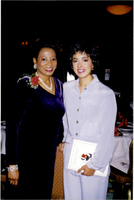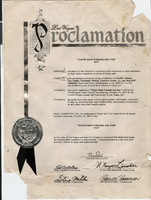Search the Special Collections and Archives Portal
Search Results

Photograph of Debbie Conway and Polly Gonzalez at the Nevada Minority Purchasing and Contracts Ceremony Banquet, circa 1998
Date
Archival Collection
Description
Color photograph of Debbie Conway and Polly Gonzalez at the Nevada Minority Purchasing and Contracts Awards Ceremony Banquet.
Image

Photograph of Debbie Conway assisting and coordinating the Martin Luther King, Jr. Statue Dedication Ceremony, circa 1998
Date
Archival Collection
Description
Color photograph of Debbie Conway assisting and coordinating the Martin Luther King Statue Dedication Ceremony.
Image

Photograph at Berkley Square Historic District banner unveiling event, February 9, 2013
Date
Archival Collection
Description
Ruth D'Hondt, president of the Berkley Square neighborhood association, speaks at the banner unveling event, February 9, 2013.
Image

Proclamation certificate for "That's What Friends are For" Day, October 10, 1987
Date
Archival Collection
Description
City of Las Vegas document announcing 1987 fundraiser that roasted Louis Conner at the Moulin Rouge.
Text
Agnes Marshall oral history interview
Identifier
Abstract
Oral history interview with Agnes Marshall conducted by Claytee D. White on September 12, 2011 for the African Americans in Las Vegas: a Collaborative Oral History Project. Marshall discusses her family being one of the first families to move into Berkley Square, the first middle-class black housing development designed by Paul Williams. She also recounts her experiences with the nightlife in Las Vegas, Nevada during the heydays of Jackson Street, including clubs such as Cotton Club and Town Tavern, and restaurants like Mom's Kitchen.
Archival Collection
Billy Paul Smith oral history interview
Identifier
Abstract
Oral history interview with Billy Paul Smith conducted by Claytee D. White on October 13, 2013 for the African Americans in Las Vegas: a Collaborative Oral History Project. Smith discusses his careers as a chemist, mathematician, health physicist, and a tutor for young people. He talks about experiencing segregation in Las Vegas, Nevada, as well as his experiences in Area 51 and Yucca Mountain as a nuclear waste repository.
Archival Collection
Joy Boggs oral history interview
Identifier
Abstract
Oral history interview with Joy Boggs conducted by Claytee D. White on February 18, 2021 for African Americans in Las Vegas: a Collaborative Oral History Project.
Joy Boggs talks of her work with the University of Nevada Las Vegas' College of Fine Arts as the Business Manager and her time serving as the Public Scholar in Residence for the Marjorie Barrick Art Museum's annual Womxn of Color Arts Festival.
She also briefly discusses her educational and family background as well as her personal philosophies.
Archival Collection
Pamela Jones Brown oral history interview
Identifier
Abstract
Oral history interview with Pamela Jones Brown conducted by Claytee D. White on June 12, 2019 for the Boyer Early Las Vegas Oral History Project. In this interview, Brown discusses her upbringing in Nashville, Tennessee and moving to Las Vegas, Nevada in 1968. She remembers her career as a school teacher, her employment for the Public Broadcasting Service (PBS), and writing about the history of African Americans in the United States. Lastly, Brown talks about the research behind her publications, African Americans migrating to the western United States, and early Las Vegas history.
Archival Collection
Jacqueline Barker oral history interview
Identifier
Abstract
Oral history interview with Jacqueline Barker conducted by Claytee D. White on February 14, 2013 for the African Americans in Las Vegas: a Collaborative Oral History Project. In this interview, Barker discusses her upbringing in Las Vegas, Nevada and growing up in the Westside. She talks about the importance of the church in the Westside and the significance of education in her family. Barker remembers her father’s involvement with school integration in Las Vegas, the sixth grade centers, and the racism she experienced while attending the University of Nevada, Reno during the 1970s. Later, Barker compares her experience in higher education to that of her mother’s, and the race riots in 1969. Lastly, Barker discusses the history of African Americans in unions, her career in education, and the social and psychological impacts that African Americans faced in Las Vegas.
Archival Collection
Woodrow Smith oral history interviews
Identifier
Abstract
Oral history interviews with Woodrow Smith conducted by Claytee D. White on February 10, 2014 and February 12, 2014 for the African Americans in Las Vegas: a Collaborative Oral History Project. In these interviews, Smith discusses his upbringing in Chattanooga, Tennessee and describes moving to another part of Chattanooga due to the violence his family experienced. He talks about attending Tuskegee University, studying engineering, and being taught by Tuskegee Airmen professors. Later, Smith discusses his work at the Nevada Test Site, the aerospace industry, and moving to Las Vegas, Nevada in the mid-1980s. Lastly, Woodrow recalls his experiences in Las Vegas and describes investing into a McDonald's franchise.
Archival Collection
